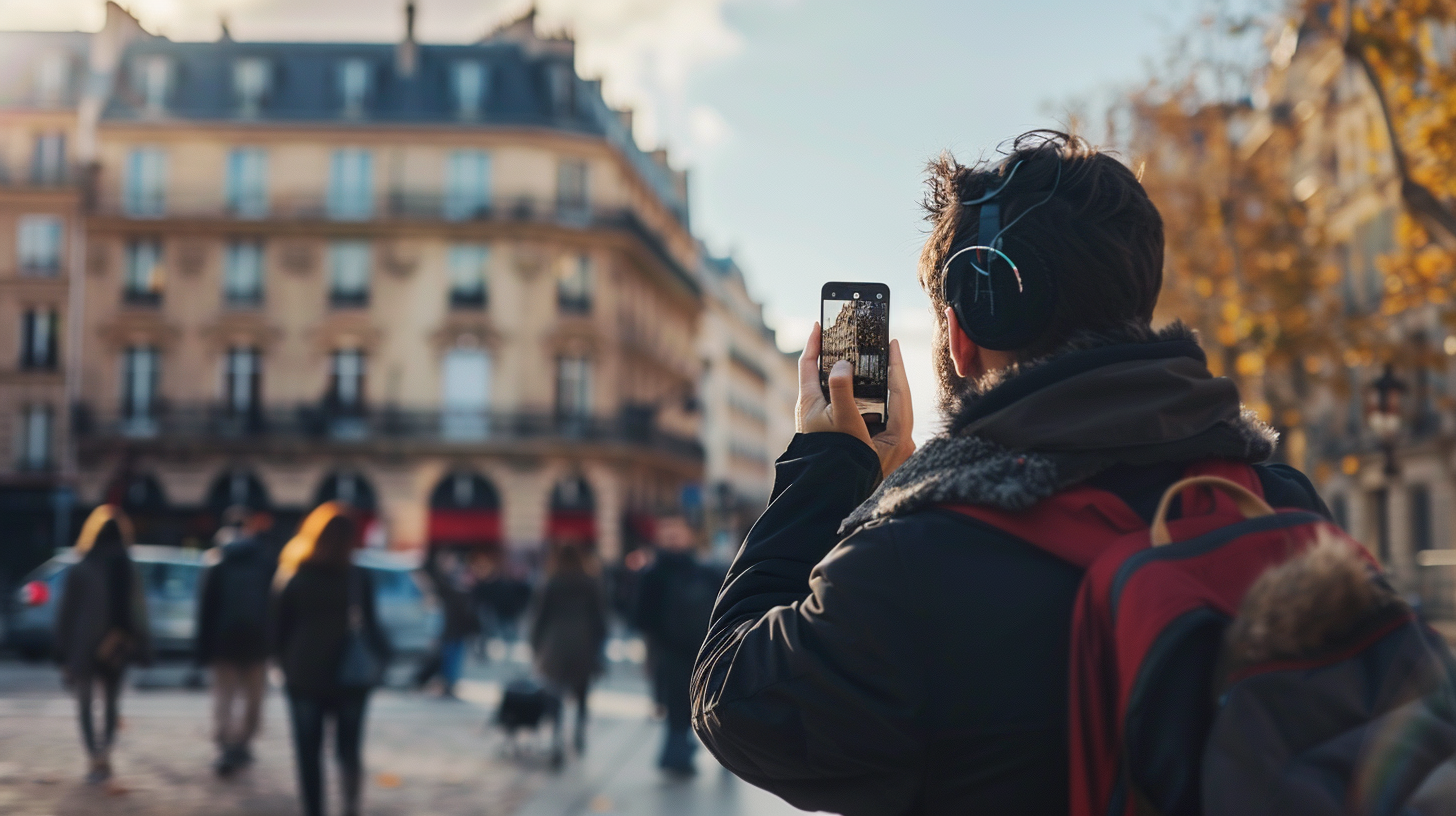
The Transformative Power of Technology in Travel Businesses
Table of Contents:
Travel market growth
Technological Innovations Transforming Travel Habits
Personalisation: Meeting the Unique Needs of Every Traveller
Trends in Travel Industry
Impact on Business Productivity and Processes
Funding Strategies for the Future
Final Thoughts: The Future of Travel Industry
Travel has always been a popular and evolving industry. Convincing data collected in various studies shows that this sector will only go forward. However, in recent years it has witnessed a remarkable shift in dynamics. Several innovative trends have emerged, revolutionising the way businesses operate and interact with their customers. Online resources have changed the entire travel process, giving travellers access to a wide range of options.
And this transformation is not a one-way street. Travellers’ demands and expectations have influenced the development of technology in the industry. As travellers seek more seamless experiences, travel businesses are compelled to adopt innovative technologies to meet these expectations. It is crucial for businesses to adapt and embrace these advancements to thrive in the ever-changing world of travel.
In this article, we will delve into the transformative impact of technology on travel businesses, explore the key innovative trends and their implications for businesses operating within this dynamic area, and examine how to leverage these tendencies to drive user engagement and loyalty.
Travel market growth
Over the past few years, the travel and tourism industry has undergone significant fluctuations and changes. The pandemic hit hard, forcing some companies to leave the market, while others had to find new solutions to adapt to the new challenging conditions. The industry required a notable transformation, which happened thanks to the constant development of technology and the widespread use of mobile applications.
Despite such geopolitical upheavals, the travel and tourism industry is returning to normal. The sector has reached its pre-pandemic peak, demonstrating its resilience and reaffirming its crucial role in the global economy. In 2022, it accounted for $7.7 trillion of global GDP (Statista). By 2023, it represented 9.1% of the global GDP, reaching just over $9.9 trillion. That financial footprint was the largest since the peak travel year of 2019, trailing by only 4%
The World Travel and Tourism Council (WTTC) predicts that 2024 will be a record year, with its global economic contribution reaching an all-time high of $11.1 trillion.
Technological Innovations Transforming Travel Habits
The industry owes this growth to the rapid advancements in technology. However, this transformative shift has not only redefined how people plan and embark on trips but also reshaped consumer behaviour.
Travelling is going mobile
As travellers increasingly turn to their smartphones for convenience and accessibility, the demand for intuitive and feature-rich travel apps has skyrocketed. Innovative travel apps have emerged as powerful tools capable of leveraging new trends to drive user engagement and loyalty.
Through seamless integration with booking platforms, navigation tools, and payment gateways, travel apps have become indispensable companions for modern-day travellers. By harnessing the power of mobile applications, travel businesses can forge deeper connections with consumers, unlock new revenue streams, and chart a course toward a future where exploration knows no bounds.
A switch from agencies to planning trips on their own
Advancements in technology have led to a paradigm shift in consumer behaviour within the travel industry. It has significantly elevated consumers’ expectations to levels never seen before. While in the past, travellers relied heavily on travel agencies, according to TravelPerk now they prefer to plan their trips on their own. According to Statista, in the second-to-last quarter of 2022, the most popular search term on Google in the UK was “hotel,” with over 18 million searches.
Nowadays, travellers seek expert guidance on every aspect of their trip. From booking flights and accommodations to researching destinations and reading reviews, mobile devices have become an essential tool for them. Additionally, the rise of mobile payments and digital wallets has made it easier than ever to make purchases on the go.
An August 2022 survey revealed that more than half of respondents see comprehensive travel apps as their primary planning tools by 2033. Out of the 2,017 people surveyed, 41% of them prefer using online travel agencies (OTAs) to book their trips. This preference can be attributed to the convenience and benefits offered by OTAs, such as easy booking processes and access to discounts and exclusive deals.
However, a follow-up survey in March 2023 revealed that almost 90% of travellers worldwide are frustrated while attempting to plan trips online, indicating that there is plenty of room for improvement in the field of travel apps. So, innovative travel apps have the potential to use these industry shifts to drive user engagement and loyalty by meeting the evolving needs of travellers.
Personalisation: Meeting the Unique Needs of Every Traveller
Today travellers demand personalised experiences, instant access to information, expert guidance, and seamless connectivity like never before. This means that businesses must leverage data and analytics to understand their customers’ preferences and tailor their offerings accordingly. Whether it’s discovering hidden gems in a foreign city or embarking on a culinary adventure, consumers are seeking experiences that resonate with their individual tastes and desires.
Instant gratification has also become a standard of modern consumer behaviour. Travellers expect immediate access to information, services, and bookings at their fingertips. From last-minute flight deals to spontaneous weekend getaways, the ability to satisfy impromptu travel desires has become essential. Travel apps can offer real-time updates, instant booking confirmations, and seamless communication channels to address travellers’ needs promptly.
Another crucial aspect is uninterrupted access to communication channels and information throughout their journey, from researching destinations to sharing experiences on social media. The proliferation of mobile devices and high-speed internet has made it easier than ever for travellers to stay connected, shaping their expectations for seamless and integrated trips.
Trends in Travel Industry
The appeal for travel is booming, but along with this, what people want from their trips is changing. A significant shift in expectations is the yearning for sustainability, authenticity, cultural appreciation, and gaining insightful knowledge. This desire for genuine experiences becomes a big part of travel. And technology plays a crucial role in meeting these demands. With a plethora of apps serving every aspect of travel, from booking flights to discovering destinations, travellers now have unprecedented access to tools and services, enabling them to craft personalised journeys effortlessly.
This exponential growth shows no signs of slowing down, as innovative features and disruptive newcomers continuously reshape the market. And the success of travel apps depends on their ability to anticipate and adapt to evolving user needs.
So, let’s explore the latest technological trends that your business can use to get to new heights.
Artificial Intelligence
Artificial intelligence lies at the heart of the travel industry’s technological revolution, enabling apps to transcend mere functionality and deliver truly transformative experiences. AI plays a crucial role in data collection and analysis. Machine learning algorithms analyse vast troves of data to offer tailored recommendations and predictive insights.
For example, Skiplagged uses AI to find hidden city flight deals and save travellers money. By analysing flight routes and prices, the platform identifies opportunities to book multi-leg journeys with layovers in the traveller’s desired destination, often resulting in significant cost savings.
Investing in AI-powered chatbots can be one of the most strategic decisions in travel technology, as they provide users with instant, personalised assistance, and revolutionise sales and customer service processes by automating tasks.
By harnessing artificial intelligence (AI) and natural language processing (NLP) technologies, travel apps can provide users with continuous support and guidance. Whether assisting users in booking flights, finding accommodations, or planning activities, AI-powered chatbots offer convenience and efficiency for a streamlined user journey.
Virtual Reality
Adaptation of Virtual Reality into everyday life has created an opportunity for virtual tours that can be used by businesses of all types – hotels, restaurants, outdoor attractions and more. Virtual tours can be successfully implemented in trip planning accommodation booking applications (just imagine a virtual tour throughout the hotel!), restaurant apps or even meal ordering ones.
According to Booking.com survey, in 2023 35% of travellers expressed their intention to participate in virtual reality (VR) travel experiences. Such a feature allows users to get a preview of the surroundings or nearby attractions like theme parks, diving areas, reefs or even nature.
VR headsets aren’t that common yet, however, a recent announcement of a new chip designed for VR and AR from Qualcomm may change this tendency. This chip offers improved graphics processing, artificial intelligence capabilities, and camera capabilities. What’s more, Google and Samsung are planning to use this chip in their immersive experience technology to compete with Apple and Meta, which introduced headsets with integrated VR technology in 2023. So, that may revolutionise the mobile industry with enhanced XR experiences!
For now, still, fully experienced virtual reality requires visiting specialised places that provide such services. However, what is possible and within reach is to provide people with 360-degree views, and movies that can be watched with VR equipment for enriched experiences.
Expedia has incorporated VR into its app to offer virtual destination experiences. Users can explore hotel rooms, local attractions, and scenic views through immersive videos, providing a glimpse of what to expect before booking.
By integrating VR features into apps, you can offer a taste of adventures from the comfort of users’ homes, inspiring them to plan and book their next getaway.
Augmented Reality
Augmented reality, unlike virtual reality, is readily available and has a great future, as it can enrich people’s experience in many ways. It differs from VR in terms of immersion – Virtual Reality replaces everything we see, whereas Augmented Reality provides a digital extension to the analogue worlds via mobile or desktop devices. No need for additional equipment. Another difference is where it can be used – Augmented Reality solutions require the presence in a particular place, while Virtual Reality does not.
There are thousands of applications of AR – from real-time menu visualisations in restaurants through recreating scenes from the past during street games to real-time translations of inscriptions in cities. It can provide a gamification element to everyday hotel stays, allowing to redecorate rooms, meet virtual celebrities and collect treasures. AR would also be a great companion when it comes to providing insights into the culture (architecture, art, cuisine), history, nature and many more at the exact moment when those are needed.
For example, the WallaMe app combines travel and AR. Users can leave hidden messages, drawings, or images at specific locations around the world. Other users can then discover these hidden messages by using the app’s AR feature when they visit the same location.
Security Technology
In today’s digital world, where cybersecurity threats are becoming more common and advanced, it is necessary to remember the importance of application security. Data breaches and leakage are among the most serious threats facing companies, which can lead to serious consequences such as loss of customer trust, financial penalties and reputational damage. During the period from March 2021 to February 2022, data breaches resulted in the compromise of over 42 million records. And according to IBM, the average cost of a data breach was estimated to reach $4.2 million in 2023.
That is why practices such as security tests, security audits and procedures to prevent data leaks are more than necessary. Integrating advanced security measures, encryption protocols, and biometric authentication, can safeguard user data and transactions, building trust and reliability.
Blockchain technology holds the promise of enhancing transparency, security, and efficiency across the travel ecosystem. By leveraging decentralised networks, travel apps can streamline transactions, verify identities, and securely store sensitive information, thereby fostering trust and reliability among users and service providers alike.
Thus, Winding Tree, a decentralised travel distribution platform, uses blockchain technology to connect suppliers directly with consumers. By eliminating intermediaries such as online travel agents (OTAs) and global distribution systems (GDS), Winding Tree aims to reduce transaction costs, increase transparency, and provide fairer pricing for both travellers and suppliers.
Internet of Things (IoT)
The Internet of Things has ushered in a new era of connectivity, seamlessly integrating devices and systems across the travel sector. The implementation of it in hotel rooms and airports has greatly improved the guest experience.
Smart hotels and rooms offer high-tech experiences by connecting devices to voice-activated assistants, smart mirrors, and automated lighting and temperature controls. This allows guests to operate the centralised control and personalise their in-room experience without needing assistance.
You can use your smartphone and smartwatch as digital keys, eliminating the need for physical key cards or waiting in line at the front desk for check-in. Although this technology has been available since 2018, it’s just becoming increasingly accepted.
For instance, Hyatt’s mobile app features digital keys that use Bluetooth technology, enabling guests to unlock their hotel rooms with their phones at over 600 hotels globally. In December 2021, Hyatt further simplified the process for Apple users. At select Hyatt hotels, guests can now tap their iPhone or Apple Watch to unlock rooms, eliminating the need to open the Hyatt app.
Similarly, Hilton, which has offered digital keys to some extent since 2015, introduced a significant update last year with Digital Key Share. This feature allows multiple guests to have digital access and is currently available at approximately 80% of Hilton’s hotels worldwide.
In airports, IoT-enabled devices such as smart luggage tags and connected vehicles offer travellers real-time updates and personalised recommendations. This really transforms the travel experience into a seamless, interconnected journey.
At DFW International Airport, sensors track security queue numbers, and provide real-time wait estimates on overhead screens to keep passengers informed and reduce anxiety. This empowers passengers to estimate wait times at various security checkpoints upon arrival and strategise their path to the departure gate.
Similarly, Miami Airport employs beacon tech to guide passengers via smartphone apps to gates and nearby amenities such as bookstores, lounges, restaurants, or restrooms.
Virtual Queues
Virtual queues are gaining popularity as a solution for managing passenger demand. Users can reserve a spot in line and receive notifications when it’s their turn, streamlining the check-in and check-out process at hotels, saving time and hassle.
Many theme parks around the world have implemented virtual queue systems for their popular attractions. For instance, Disney’s FastPass+ system allows visitors to reserve ride times in advance, reducing wait times and allowing guests to enjoy other parts of the park while they wait for their turn.
Many airports now offer virtual queue systems for security checkpoints. Travellers can join the queue through the airport’s mobile app or website before arriving at the airport. They receive notifications about their assigned security screening time slot, allowing them to plan their arrival accordingly and spend less time waiting in line at the airport.
Heathrow Airport offers a FastTrack Security service that allows passengers to join a virtual queue for expedited security screening. Travellers can purchase FastTrack passes online or through the Heathrow app, enabling them to bypass the regular security lines and proceed to a dedicated FastTrack lane.
Voice Search & Voice Control
Voice control technology offers travel companies the means to create touch-free environments, enhancing accessibility and guest experience. This trend is particularly prominent in the hotel industry, where voice-controlled devices in hotel rooms allow guests to adjust room settings, contact the front desk, and use smart speakers or voice-controlled hubs. This technology can be extended to other areas of the tourism industry, offering additional levels of safety and convenience.
Voice control technology also enables travel companies to create touch-free environments, enhancing accessibility and guest experience. For instance, Marriott International uses such smart room features in their hotels.
An increasing number of travel customers are also using voice search to discover and reserve airline tickets, hotel accommodations, and travel experiences. The rise in popularity of smart speakers such as Amazon Echo and Google Home, along with digital assistants like Alexa and Siri, has facilitated this feature, so it is wise to seize this opportunity immediately.
Biometric Identification
Biometric technologies such as facial recognition, fingerprint and retina scanning are revolutionising identity verification and access control within the industry. By replacing traditional authentication methods with biometric solutions, travel apps can streamline check-in processes, enhance security, and improve the overall user experience.
Facial recognition technology is already in use at various global airports, such as Hong Kong International Airport, Tokyo Narita, Tokyo Haneda, Indira Gandhi International in Delhi, London Heathrow, and Paris Charles de Gaulle.
Emirates has introduced a “biometric pathway” at Dubai International Airport, allowing passengers to navigate immigration and boarding procedures without presenting their documents.
The European Union plans to launch an automated entry-exit system in 2024, using fingerprints and facial images to identify foreign travellers and speed up border control checks.
Also, major airlines in the United States (American Airlines, United, and Delta) have been conducting experiments with biometric check-in, bag drops, and boarding gates at select airports over the past few years.
Some hotels already use this technology to grant room access via fingerprints or enable semi-contactless check-outs. In China, consumers can check in at two Marriott International properties (Hangzhou Marriott Hotel Qianjiang and Sanya Marriott Hotel Dahonghai Bay) with facial recognition at a self-help smart kiosk just by scanning their ID cards.
Facial recognition payment technology has been available in China since 2017, introduced through services like “Smile to Pay” by Alipay and “Frog Pay” by WeChat Pay for payments in supermarkets. These systems operate by scanning the customer’s face with a small camera installed at the checkout, allowing customers to pay simply by having their faces scanned.
So there’s a strong possibility that in the future, this technology will enable customers to pay for meals in the hotel restaurant simply by walking through the exit.
Enhanced Safety Features
Safety remains supreme and a top priority for travellers, particularly in unfamiliar or remote destinations. According to Tourlane 46% of female travellers expressed concerns about their safety when they travel alone. People are becoming more conscious of potential risks and are seeking destinations and accommodations that prioritise their safety.
Thus, there is a need for new technologies and services aimed at enhancing security. GPS tracking devices, real-time safety alerts, emergency assistance, and location-based services are empowering travellers to navigate the world with confidence and peace of mind.
Robotic Assistance
Robotic assistance is increasingly prevalent in the travel industry, where robots handle various tasks, from customer service to luggage handling. By embracing robotics, travel apps can automate repetitive tasks, cut operational costs, and improve service efficiency and quality, enhancing the overall travel experience.
For instance, within hotels robots are employed in concierge-like roles, greeting guests and providing them information. In restaurants, they could assist with food preparation and service. At airports, robots can detect concealed weapons, and some manufacturers produce intelligent luggage cases that autonomously follow travellers. Moreover, travel agents use robots for pre-screening, making wait times more productive.
In 2019, British Airways installed 80 automated bag-drop machines at Heathrow Airport, alongside experimenting with self-driving luggage vehicles. As a result, the integration of robotic technologies helped to make fewer queues and streamlined journeys, making them faster and more seamless.
Delivery Apps to Replace Room Service
Delivery apps are increasingly being offered as alternatives to traditional room service, which can often be costly. This shift not only saves time and money for guests but also provides them with a wider range of dining options.
Hotels are embracing this concept by partnering with external companies to handle food delivery.
For instance, in 2021, Hyatt initiated a pilot program with snack delivery service Gopuff to offer prepackaged and hot meals to rooms at select Hyatt Place locations. The success of this program has led to its expansion to more properties nationwide.
Impact on Business Productivity and Processes
Technological advancements have brought remarkable changes in consumer behaviour and expectations, challenging businesses to adapt and innovate to stay competitive. From the rise of online booking platforms to the growing demand for personalised customer experience, companies in the industry have to embrace technology to meet the new needs of modern travellers.
However, with these changes come new opportunities and challenges. This requires businesses to rethink their strategies and adopt agile approaches to stay ahead.
If you need a consultation about your travel app, you can always contact us to help you to turn your travel app idea into reality and build the app your users desire!
Optimisation through Automation and Data-Driven Insights
Automation, data-driven insights, and predictive analytics have become powerful tools for optimising internal processes and driving efficiency within travel businesses.
Automating repetitive tasks can improve your business productivity by streamlining repetitive tasks, reducing human error and enhancing efficiency. For example, automated check-in systems not only speed up the boarding process but also free up staff to focus on delivering exceptional customer service.
To make more informed decisions about various aspects of the business, from inventory management to pricing strategies, you can leverage data analytics solutions. Due to them, travel businesses can gain a comprehensive understanding of customer preferences, market tendencies, and competitor strategies.
Predictive analytics takes data-driven decision-making to the next level by forecasting future trends and behaviours. Travel companies can anticipate demand fluctuations, optimise resource allocation, and adapt offers to customer needs.
Hotel chains are using predictive analytics to forecast demand and adjust pricing dynamically, maximising revenue and occupancy rates. Airlines are employing AI-powered chatbots to provide personalised assistance to travellers, improving customer satisfaction and reducing support costs.
Travel agencies are harnessing big data analytics to identify future events, preferences, and emerging markets, enabling targeted marketing campaigns and strategic partnerships.
Importance of Agility and Adaptability
Agility and adaptability are essential for harnessing the full potential of technology. As new innovations emerge and consumer preferences evolve, businesses must remain flexible to seize opportunities and mitigate risks.
Embrace a culture of innovation, experimentation, and continuous improvement to be able to respond quickly to market dynamics, customer feedback, and technological advancements. Agility helps businesses to grow quickly, catch new opportunities, and stay ahead of the competition, while adaptability ensures long-term relevance and sustainability in an increasingly digital world.
Whether it’s embracing emerging technologies or pivoting business strategies in response to market shifts, adaptability is key to gaining a competitive edge in the travel industry.
Funding Strategies for the Future
New trends and technologies usually require investments, which are necessary to maintain a leading position in the industry or effectively compete for customers. To remain competitive, travel businesses cannot be left behind and must invest in the development and implementation of new solutions. Such investments are vital for ensuring stable growth.
Therefore, finding sustainable funding strategies is more crucial than ever. Businesses must explore alternative financing models alongside traditional funding sources to effectively support app development and innovation.
If you are looking for more comprehensive information, you can read Jakub Drynkowski’s guide on how to get funding for your app.
Traditional Funding for Early-Stage Startups
For startups and entrepreneurs looking to launch new travel apps or scale existing ones, traditional sources of funding remain essential. Participation in accelerators and incubators grants access to industry experts, potential investors, and a supportive community. This funding strategy not only provides financial backing but also sets the stage for long-term success.
Crowdfunding campaigns on platforms like Kickstarter and Indiegogo offer a new avenue for funding, allowing businesses to engage potential investors, and generate the funds they need while building a loyal community of supporters.
Venture capital firms provide funding to early-stage startups with high growth potential, offering capital in exchange for equity stakes in the company. Angel investors, often successful entrepreneurs or industry experts, also invest in startups at the early stages, providing capital, mentorship, and strategic guidance.
Government grants and incentives also play a crucial role in supporting technology adoption, improving competitiveness, and driving economic growth in the industry.
Financing Models for Business Growth
Emerging trends in funding offer innovative approaches to finance app development and technology adoption that allow companies to tailor their financing arrangements to suit their specific needs and risk profiles.
Collaborations with Tech Giants
The travel and tourism industries have witnessed an increasing number of collaborations and partnerships between traditional travel companies and tech giants. By joining forces, these companies can tap into each other’s expertise and resources, ultimately driving innovation in the industry.
For example, airlines partner with technology companies to develop smart luggage solutions and hotels collaborate with online travel agencies to enhance their booking systems. These collaborations not only provide access to funding but also open doors to new markets and customer bases.
Corporate Partnerships
Collaborating with established corporations can provide access to valuable resources and funding. Travel companies can explore partnerships with airlines, hotel chains, and other industry players to leverage their existing infrastructure and customer base.
These partnerships can take various forms, including joint marketing campaigns, co-branded products, or revenue-sharing agreements, creating opportunities to enhance sustainable travel and create a seamless travel experience.
Final Thoughts: The Future of Travel Industry
As we peer into the horizon of the travel industry, one thing remains abundantly clear: technology will continue to be the driving force behind innovation and adaptation. Technological advancement is continuously changing the travel experiences and consumer preferences, as well as increasing emphasis on sustainability.
Embracing this digital revolution isn’t just a choice; it’s a necessity for survival and success in an increasingly competitive market. Businesses that stay on top of these trends and adapt their strategies accordingly will not only survive but thrive in an ever-evolving landscape.
However, there is still a myriad of opportunities for businesses to innovate. Challenges such as fierce competition, fluctuating consumer demand and geopolitical uncertainty must be overcome. Navigating this dynamic landscape requires agility, foresight, and a commitment to delivering value to customers while thinking about the planet.
If you have any questions about the future of travel industry or how turn your travel app idea into reality, feel free to contact me on LinkedIn or via email at [email protected].
Uncover the transformative power of travel technology to unlock new opportunities for your business and shape the future of the industry!
With a background in tech since 2016, he's been involved in developing a wide range of digital products, including web and mobile applications, eCommerce projects, custom integrations, and bespoke platforms.
As a consultant, he helps businesses identify the best IT solutions to optimize their processes, overcome daily challenges, and achieve their goals.








